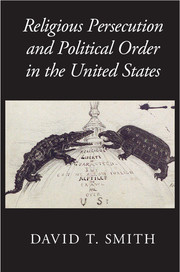Book contents
- Frontmatter
- Dedication
- Contents
- Acknowledgments
- 1 Introduction
- 2 Religious freedom and persecution in America: A theoretical overview
- 3 Joseph Smith and the rise of Mormonism: The political threat of religious charisma
- 4 The federal response to Mormonism
- 5 Jehovah's Witnesses and the flag salute, 1870–1940
- 6 Mass violence against Jehovah's Witnesses, 1940–1942
- 7 The Catholic experience in America
- 8 The Jewish experience in America
- 9 The Islamic experience in America
- 10 Conclusion
- Sources and bibliography
- Index
10 - Conclusion
Published online by Cambridge University Press: 05 November 2015
- Frontmatter
- Dedication
- Contents
- Acknowledgments
- 1 Introduction
- 2 Religious freedom and persecution in America: A theoretical overview
- 3 Joseph Smith and the rise of Mormonism: The political threat of religious charisma
- 4 The federal response to Mormonism
- 5 Jehovah's Witnesses and the flag salute, 1870–1940
- 6 Mass violence against Jehovah's Witnesses, 1940–1942
- 7 The Catholic experience in America
- 8 The Jewish experience in America
- 9 The Islamic experience in America
- 10 Conclusion
- Sources and bibliography
- Index
Summary
INTRODUCTION
To my knowledge, this is the first study to compare the persecution experiences of different religious minorities throughout American history. What can a work of comparative social science add to the many historical studies of persecution focusing on individual religious groups, most of which explore their cases in far more detail than I have been able to do here? In this book I have proposed a theoretical framework to explain variance within and across cases of religious persecution over time. In this concluding chapter, having examined the experiences of numerous religious minorities, I revisit some of the comparative lessons learned from studying these cases together within a single theoretical framework. I consider both the strengths and limitations of this framework, and what future research may either extend its applicability or lead to a different, better theoretical understanding.
Perhaps unconventionally for a conclusion, I will also briefly examine two other cases – MOVE, a small African American sect whose leader and many other members died when Philadelphia police bombed their compound in 1985, and the Branch Davidians of Waco, Texas, whose leader and many followers were killed when federal agents raided their compound in 1993. The point of including these two cases is to show my theory is robust beyond the experiences of well-known religions that survived their persecutory encounters with the state. If anything, it applies even more to these groups, which never achieved the mantle of religious legitimacy and today are defined by their violent endings. They are not often mentioned in mainstream discourse about religious persecution in the United States, which makes them useful for understanding the logic of violent state response from the viewpoint of state actors close to our own time, who did not believe that they were engaging in religious persecution.
Finally, I reflect on how experiences of religious persecution affected the religions involved across the medium and long term. Most of the religions discussed in this book are much more favorably perceived today than they were at the time of their persecution. Our sense of injustice at their persecution is shaped by our contemporary understanding of them as legitimate religions. I consider how these religions themselves changed in response to persecution, and how these changes affected their place in American life.
- Type
- Chapter
- Information
- Religious Persecution and Political Order in the United States , pp. 220 - 240Publisher: Cambridge University PressPrint publication year: 2015



